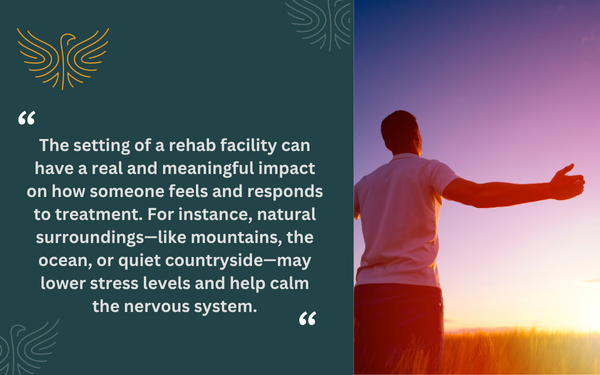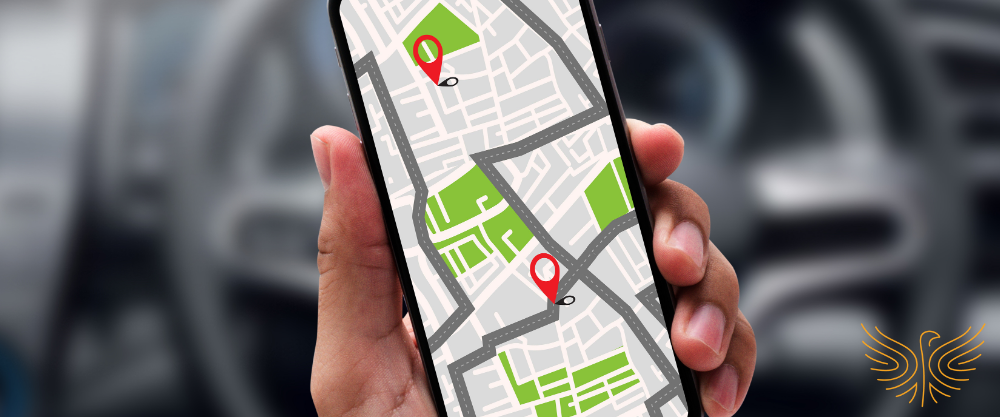When assessing potential rehab treatment options, many people focus on the treatment itself, costs, staff credentials, and program length. But the physical location of the rehab facility or center matters, too. Additionally, the environment surrounding a rehabilitation center—whether urban or rural, coastal or mountainous, or close to home or distant—can significantly influence your or your loved one’s recovery journey.
In other words, the location of rehab treatment may impact your recovery outcomes more than you might initially realize. Thus, it’s an essential factor to consider when researching rehab centers. So, here are a few things you’ll want to keep in mind regarding location (and why!).

_______________________________________________________
Why Does the Location Matter?
The setting of a rehab facility can have a real and meaningful impact on how someone feels and responds to treatment. For instance, natural surroundings—like mountains, the ocean, or quiet countryside—may lower stress levels and help calm the nervous system. This kind of environment often makes the emotional work of recovery feel a little bit more manageable.
Being in a new location, away from familiar triggers and routines, can also help create mental space. That distance makes it easier to reflect on habits, build new coping skills, and start fresh without constant reminders of past behavior. However, it’s important to note that this may mean being away from your support systems—which can play a key role in your recovery.
So, let’s take a closer look at these individual location factors and why they matter.
Distance from Triggers and Old Habits
Choosing a rehabilitation facility away from familiar surroundings creates a buffer between the individual and environmental cues that previously reinforced substance use. This physical separation disrupts ingrained addiction behavioral patterns associated with specific locations, social circles, and daily routines.
This geographical boundary also significantly reduces the risk of impulsively leaving treatment or early relapse. When experiencing difficult emotions or cravings during challenging phases of recovery, the logistical barriers of distance naturally make acting on these impulses more complicated.
Family Proximity
When family relationships are supportive and healthy, nearby treatment facilities enable regular visitation, participation in family therapy sessions, and the development of a coordinated support system for post-discharge recovery. Family involvement often correlates with better treatment outcomes and smoother transitions back to everyday life.
However, when family systems involve codependent relationships, enabling behaviors, or unresolved conflicts, geographical proximity can undermine recovery efforts. In these situations, distance creates space for individuals to develop independent coping mechanisms and establish healthy boundaries without immediate family pressure.
Climate and Seasonality
The geographical climate where rehabilitation takes place can significantly influence both mood and treatment engagement. Regions with abundant sunshine and moderate temperatures facilitate year-round outdoor therapeutic activities, which naturally boost vitamin D production, regulate sleep cycles, and stimulate endorphin release—all biologically supportive factors for recovery. Warm, sunny environments often enhance motivation and energy levels during the challenging early stages of treatment.
In contrast, locations with harsh winters or prolonged periods of limited daylight may present additional challenges for individuals struggling with co-occurring depression or Seasonal Affective Disorder. However, these settings can sometimes encourage deeper introspection, group bonding, and focused therapeutic work with fewer external distractions.
When selecting a location, ensure you or your loved one honestly assesses your or their seasonal mood patterns and choose environments that align with emotional needs, especially during the vulnerable period of early recovery.
Cost and Insurance Considerations by Region
Treatment costs fluctuate substantially based on geographical location, influenced by regional cost-of-living differences, facility overhead expenses, and market competition. Coastal areas and desirable vacation destinations typically command premium rates. Meanwhile, facilities in the Midwest or Southern states often provide comparable services at lower price points. These regional differences can amount to thousands of dollars in out-of-pocket expenses, even with insurance coverage.
Insurance coverage itself frequently contains geographical limitations, with some policies restricting benefits to in-network providers within specific regions or imposing higher copayments for out-of-state treatment.
Aftercare Support and Sober Community Access
Selecting a location with quality aftercare resources—including graduated levels of outpatient care, diverse support group options, sober living communities, and recovery-focused social activities—provides scaffolding during the vulnerable transition from structured treatment to independent living.
Urban centers typically offer greater diversity of recovery communities, specialized support groups, and employment opportunities for individuals in recovery. However, rural or suburban areas may provide fewer formal resources but sometimes feature tightly-knit recovery communities with strong interpersonal connections and support.
The connection to aftercare resources proves so vital that many individuals choose to relocate permanently to areas with strong recovery communities after completing treatment. This substantial life decision reflects the undenying importance of ongoing community support in maintaining long-term sobriety and building a fulfilling life in recovery.
_______________________________________________________
Is Freedom Recovery Centers Right For You?
While treatment quality and clinical care are important, location can significantly shape the rehab experience and recovery success. Whether you need distance from home, peace in nature, or access to specific resources, the right setting can support your healing on every level.
At Freedom Recovery Centers (FRC), we’ve created a recovery environment that’s as supportive and restorative as the care we provide. Our caring team is with you every step of the way, ensuring you feel safe and supported. Call us today at 804-635-3746 to learn more.
.svg)






.svg)

.svg)



.svg)
